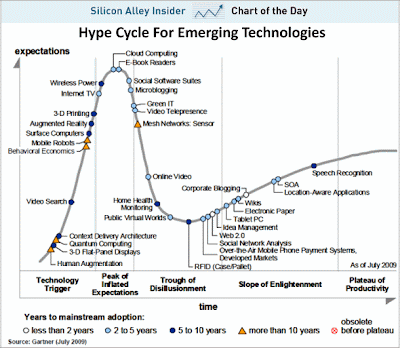
Remember the bursting of the internet bubble at the turn of the century? It was the perfect moment for technophobes. All the promise held by technology seemed to go up in smoke:
Suddenly, the talking heads had always known it: E-commerce was a farce, the only way to make money online was with porn, and e-mail was the only real application the net had to offer.
Sounds ludicrous now, but in fact it seems that these moments of disillusionment are normal. A lot like the last spasm of the luddites.
When a new technology emerges, we tend to get so intoxicated by the far horizons it opens up, that we overlook important technical details and overstate its possibilities in the short term. When our expectations are not met, we inevitably get disillusioned with our new toy.
But then the real applications of the new technology start getting hold and becoming economically viable. Before you know it, we can’t imagine how we survived without it.
This is a description of the Hype Cycle, a concept launched by the consultancy Gartner, inc., to describe the adoption by society of technological innovations. An important concept to remember, both when the enthusiasts predict the coming technological rapture and when the pessimists condemn humanity to life as usual.
The Cyborg
P.S. From Gartners' updated chart for 2009 its seems that twitters bubble is about to burst.
